should用法归纳与练习
Should与Ought to的讲解和练习

Should与Ought toI. 复习1. Some people can live without meat.2. May I use the phone please, Mr. White?3. Could you tell me something about the book?4. You must not smoke here.5. What flavor would you like, chocolate or strawberry?6. We should put rubbish in the bin.7. She shouldn’t discuss it.8. Should we discuss it now? / Ought we to discuss it now?-- Yes, we should/ ought to. -- No, we shouldn’t/ ought not to.9. The students ought not to sleep in the class.10. Tom ought to hand in his homework on time.II. 二者区别:时态Should Ought to 肯定句sb. should do sth. sb. ought to do sth.否定句sb. should not do sth. sb. ought not to do sth. 一般疑问句Should sb. do sth.? Ought sb. to do sth.?简略回答Yes, sb. should do sth.No, sb. should not / shouldn’t do sth.Yes, sb. ought to do sth.No, sb. ought not /oughtn’t to do sth.should和ought to在用法上要注意以下3点:1.没有人称和数的变化。
英语中should的用法归纳

英语中should的用法归纳一、Should 表示过去将来时,即从过去观点看将来要发生的是,多用于间接引语中。
We thought that we should never see you again. 我们想我们再也看不到你了。
The BBC weather report this morning said that we should have rain.今天早上,BBC电台天气报告说,今天有雨。
二、Should 表示义务、责任、常译为“应当”,“应该”,或表示一种估计的情况,译成“按理应当”,“估计......”。
Why should I pay him?为什么我该付给他钱?They should be there by now,I think. 我估计,他们现在到那儿了。
Should 用于完成时态,表示对过去发生的动作的一种推测,译成“应该已经......”。
You should have washed the wood. (But you haven't.)你应该把伤口清洗了。
(然而你没有)三、Should 用于虚拟语气中。
(1)用于It is necessary (important,strange.。
that.。
)中,在美国英语中should 常省去。
It is important that we (should)learn English well. 我们学好英语很重要。
(2)用于It is ordered (suggested)that.。
中,而在美语中should常省去。
It is decided that we (should)finish our work in a week.决定我们要在一周之内完成我们的工作。
(3)用于表示命令、请求、建议、决定等词后面的宾语从句中,在美国英语中should常省去。
He wrote,suggesting that Mr. Wang (should)come to Beijing. 他信中建议王先生到北京来。
(完整版)情态动词should的用法专项练习
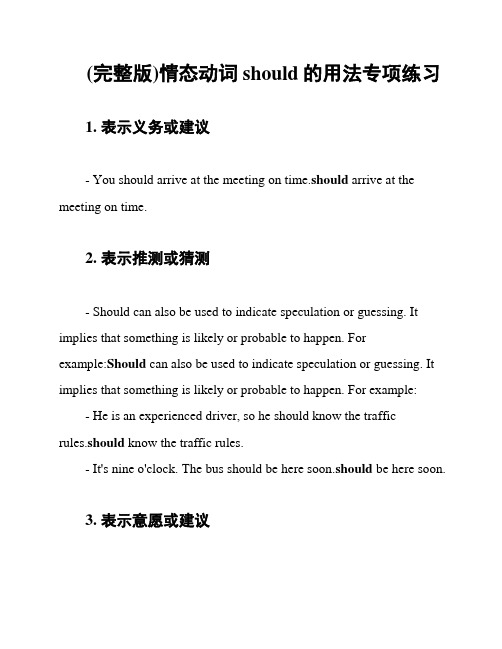
(完整版)情态动词should的用法专项练习1. 表示义务或建议- You should arrive at the meeting on time.should arrive at the meeting on time.2. 表示推测或猜测- Should can also be used to indicate speculation or guessing. It implies that something is likely or probable to happen. Forexample:Should can also be used to indicate speculation or guessing. It implies that something is likely or probable to happen. For example: - He is an experienced driver, so he should know the trafficrules.should know the traffic rules.- It's nine o'clock. The bus should be here soon.should be here soon.3. 表示意愿或建议- I should go to the gym more often.should go to the gym more often.- You should see a doctor if you have a persistent cough.should see a doctor if you have a persistent cough.4. 与条件句连用- If it rains tomorrow, we should stay indoors.should stay indoors.- Should you need any assistance, please don't hesitate to contact us.5. 句型结构- When using should, there are a few sentence structures to keep in mind:should, there are a few sentence structures to keep in mind: - Affirmative: subject + should + base verb should + base verb- You should eat more vegetables.should eat more vegetables.- Negative: subject + should not + base verb / subject + shouldn't + base verb should not + base verb / subject + shouldn't + base verb - You should not waste food.should not waste food.- Children shouldn't play with fire.shouldn't play with fire.- Interrogative: Should + subject + base verb?Should + subject + base verb?- Should I call him back?Should I call him back?6. 注意事项- Avoid using should too frequently in writing. Overuse can make writing seem repetitive. Instead, vary your language by using synonyms like "ought to," "could," or "might".should too frequently in writing. Overuse can make writing seem repetitive. Instead, vary your languageby using synonyms like "ought to," "could," or "might".- The use of should may differ in formal and informal contexts, sobe mindful of the tone and register of your writing.should may differ in formal and informal contexts, so be mindful of the tone and register of your writing.以上是情态动词should的一些常见用法示例。
should用法归纳与练习hbetter

should用法归纳一、Should 表示义务、责任、常译为“应当”,“应该”,或表示一种估计的情况,译成“按理应当”,“估计......”;Why should I pay him 为什么我该付给他钱They should be there by now, I think. 我估计,他们现在到那儿了;二、用于成语中I should like to......“我想做......”I should like to ask the teacher a question. 我想问老师一个问题;三、shouldn’t :不应该表示责备;应该不,应该没有表示推测;如:You shouldn't be so lazy.你不应该这么懒惰;There shouldn't be any problem with your listening.你的听力应该没有问题了;用should 或shouldn't 填空;1. All of us ________study hard and learn English well.2. As a student, you_______ eat in class.3. You _______speak to your parents like this ,you must be polite 有礼貌4. You __________eat less and take more exercise if want ot be healthier and stronger.5. My mother is very tired after work, I________ do some housework for her.had better常简略为'd better是一固定词组,had better"最好",用于表示对别人的劝告、建议或表示一种愿望;其用法有以下几点:一、had better后面必须跟动词原形;had better后跟动词原形即不带to的不定式,构成had better do sth.句型;这里的had不能用have来替换;如:You'd better go to hospital at once.你最好立即去医院看病;Tom, you'd better go there today.汤姆,你最好今天去那儿;二、主语不论是第几人称,句子不论是什么时态,都要用had better 的形式;如:Now youhe,we had better listen to the teacher.你他,我们现在最好听老师讲;三、had better的否定式;如:常用的否定形式是将否定副词not直接放在had better的后面;如:You had better not miss the last bus.你最好不要错过末班公共汽车;You had better not leave for Nanjing the day after tomorrow.你最好后天不要动身去南京;注意:否定副词not绝不能放在had的后面;如:不能说:You hadn't better go.而应该说:You had better not go.四、在祈使句中,had有时可以省略;如:Better not do it .最好别做那事;Better not wait for them.最好不要等他们;五、had better在表示对别人劝告、建议时,不宜用于与陌生人、长辈及上级的交谈中;对长辈说话时,最好不用had better;比较有礼貌的说法是:It might be better for you...;It would be better for you...;如:It might be better for you to help me,Grandpa.爷爷,您最好能帮我一下;练习下列各句都有一处错误,请改正;'d better to wait for me at the school gate.have better write to him now.had not better go there.。
should的用法小学动词
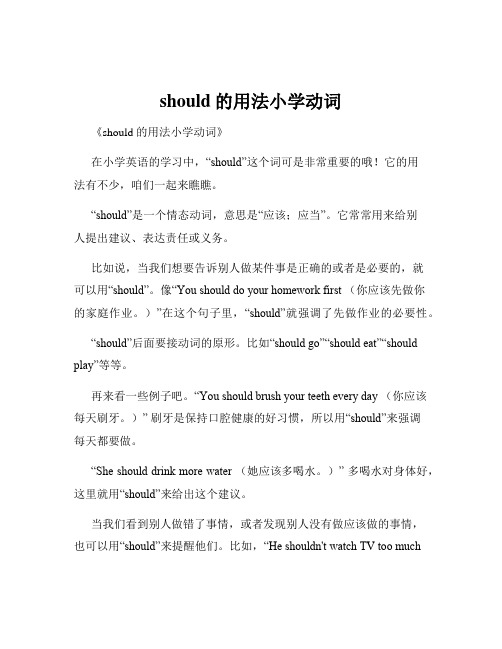
should的用法小学动词《should 的用法小学动词》在小学英语的学习中,“should”这个词可是非常重要的哦!它的用法有不少,咱们一起来瞧瞧。
“should”是一个情态动词,意思是“应该;应当”。
它常常用来给别人提出建议、表达责任或义务。
比如说,当我们想要告诉别人做某件事是正确的或者是必要的,就可以用“should”。
像“You should do your homework first (你应该先做你的家庭作业。
)”在这个句子里,“should”就强调了先做作业的必要性。
“should”后面要接动词的原形。
比如“should go”“should eat”“should play”等等。
再来看一些例子吧。
“You should brush your teeth every day (你应该每天刷牙。
)” 刷牙是保持口腔健康的好习惯,所以用“should”来强调每天都要做。
“She should drink more water (她应该多喝水。
)” 多喝水对身体好,这里就用“should”来给出这个建议。
当我们看到别人做错了事情,或者发现别人没有做应该做的事情,也可以用“should”来提醒他们。
比如,“He shouldn't watch TV too much(他不应该看太多电视。
)” 这里“shouldn't”是“should not”的缩写形式,表示“不应该”,提醒他看电视太多是不好的。
“should”还可以用在疑问句中呢。
比如,“Should I go to school today? (我今天应该去上学吗?)” 这时候就是在询问别人自己是否应该做某件事。
在回答“should”开头的疑问句时,常用“Yes, you should (是的,你应该。
)”或者“No, you shouldn't (不,你不应该。
)”小朋友们在使用“should”的时候,要注意根据具体的语境和想要表达的意思来用哦。
should用法归纳及练习
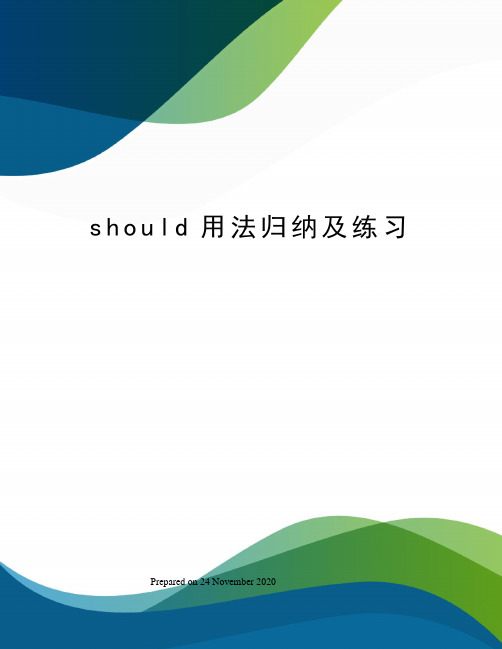
s h o u l d用法归纳及练习 Prepared on 24 November 2020should用法归纳及练习一、Should 表示过去将来时,即从过去观点看将来要发生的事,多用于间接引语中。
We thought that we should never see you again. 我们想我们再也看不到你了。
The BBC weather report this morning said that we should have rain.今天早上,BBC电台天气报告说,今天有雨。
二、Should 表示义务、责任、常译为“应当”,“应该”,或表示一种估计的情况,译成“按理应当”,“估计......”。
Why should I pay him 为什么我该付给他钱They should be there by now, I think. 我估计,他们现在到那儿了。
Should 用于完成时态,表示对过去发生的动作的一种推测,译成“应该已经......”。
You should have washed the wood. (But you haven‘t.) 你应该把伤口清洗了。
(然而你没有)三、在某些从句中,should 表示惊异、意外等情绪,常译为“竟然”。
It seems unfair that this should happen to me.真不公平,这件事竟然发生在我身上。
四、当陈述部分含有ought to ,其反意疑问句部分,美国英语中用should .She ought to stay here, shouldn't her她该留在这儿,是吗五、用于成语中I should like to......“我想(做)......”I should like to ask the teacher a question. 我想问老师一个问题。
六、"should (not) +have+过去分词(done)" 对已发生的事表示遗憾或责备,表达"本该或不该"之意。
should的特殊疑问句用法及回答
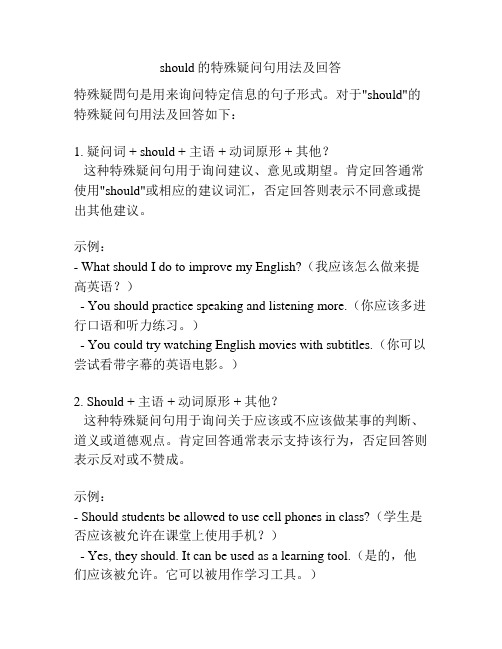
should的特殊疑问句用法及回答特殊疑問句是用来询问特定信息的句子形式。
对于"should"的特殊疑问句用法及回答如下:1. 疑问词 + should + 主语 + 动词原形 + 其他?这种特殊疑问句用于询问建议、意见或期望。
肯定回答通常使用"should"或相应的建议词汇,否定回答则表示不同意或提出其他建议。
示例:- What should I do to improve my English?(我应该怎么做来提高英语?)- You should practice speaking and listening more.(你应该多进行口语和听力练习。
)- You could try watching English movies with subtitles.(你可以尝试看带字幕的英语电影。
)2. Should + 主语 + 动词原形 + 其他?这种特殊疑问句用于询问关于应该或不应该做某事的判断、道义或道德观点。
肯定回答通常表示支持该行为,否定回答则表示反对或不赞成。
示例:- Should students be allowed to use cell phones in class?(学生是否应该被允许在课堂上使用手机?)- Yes, they should. It can be used as a learning tool.(是的,他们应该被允许。
它可以被用作学习工具。
)- No, they shouldn't. It can be a distraction and disrupt the learning environment.(不,他们不应该被允许。
它可能会分散注意力和干扰学习环境。
)请注意,以上回答只是基于常见情况。
具体的回答可能因具体语境和个人观点而有所不同。
初二情态动词should练习题
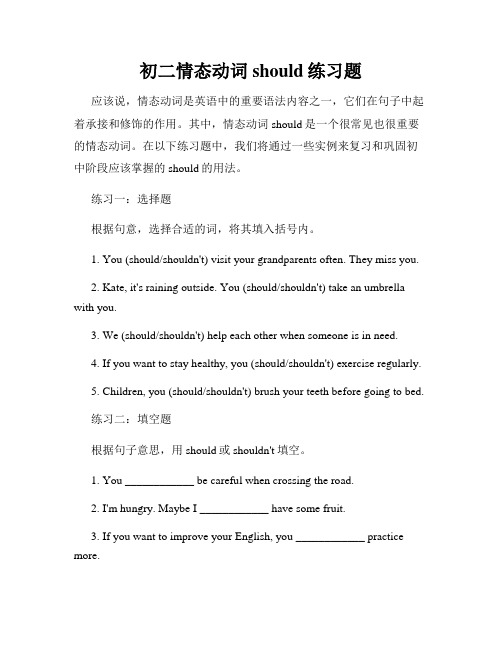
初二情态动词should练习题应该说,情态动词是英语中的重要语法内容之一,它们在句子中起着承接和修饰的作用。
其中,情态动词should是一个很常见也很重要的情态动词。
在以下练习题中,我们将通过一些实例来复习和巩固初中阶段应该掌握的should的用法。
练习一:选择题根据句意,选择合适的词,将其填入括号内。
1. You (should/shouldn't) visit your grandparents often. They miss you.2. Kate, it's raining outside. You (should/shouldn't) take an umbrella with you.3. We (should/shouldn't) help each other when someone is in need.4. If you want to stay healthy, you (should/shouldn't) exercise regularly.5. Children, you (should/shouldn't) brush your teeth before going to bed.练习二:填空题根据句子意思,用should或shouldn't填空。
1. You ____________ be careful when crossing the road.2. I'm hungry. Maybe I ____________ have some fruit.3. If you want to improve your English, you ____________ practice more.4. You ____________ stay up late. It's not good for your health.5. Jack, you ____________ turn off the lights before leaving the room.练习三:改错题找出并改正下列句子中使用should或shouldn't的错误。
- 1、下载文档前请自行甄别文档内容的完整性,平台不提供额外的编辑、内容补充、找答案等附加服务。
- 2、"仅部分预览"的文档,不可在线预览部分如存在完整性等问题,可反馈申请退款(可完整预览的文档不适用该条件!)。
- 3、如文档侵犯您的权益,请联系客服反馈,我们会尽快为您处理(人工客服工作时间:9:00-18:30)。
s h o u l d用法归纳与练
习
Company Document number:WTUT-WT88Y-W8BBGB-BWYTT-19998
should用法归纳
一、Should 表示过去将来时,即从过去观点看将来要发生的事,多用于间接引语中。
We thought that we should never see you again. 我们想我们再也看不到你了。
The BBC weather report this morning said that we should have rain.
今天早上,BBC电台天气报告说,今天有雨。
二、Should 表示义务、责任、常译为“应当”,“应该”,或表示一种估计的情况,译成“按理应当”,“估计......”。
Why should I pay him 为什么我该付给他钱
They should be there by now, I think. 我估计,他们现在到那儿了。
Should 用于完成时态,表示对过去发生的动作的一种推测,译成“应该已经......”。
You should have washed the wood. (But you haven‘t.) 你应该把伤口清洗了。
(然而你没有) 三、在某些从句中,should 表示惊异、意外等情绪,常译为“竟然”。
It seems unfair that this should happen to me.真不公平,这件事竟然发生在我身上。
四、当陈述部分含有ought to ,其反意疑问句部分,美国英语中用should .
She ought to stay here, shouldn't her她该留在这儿,是吗
五、用于成语中I should like to......“我想(做)......”
I should like to ask the teacher a question. 我想问老师一个问题。
六、"should (not) +have+过去分词(done)" 对已发生的事表示遗憾或责备,表达"本该或不该"之意。
如:①He also learns that he should have cared more about his friends.他还明白了他本应该多关心朋友。
②He shouldn't have let out the secret.他本不该泄露秘密的。
(实际情况是"他已泄密"。
)
翻译:①If he were here, 如果他(现在)在这里的话,我就会告诉他真相。
(事实是,他现在不在这里。
)
②If I had been here yesterday, 如果昨天我在这里,我就会好好教训他一顿。
(事实是:我没教训他,因为我昨天没在这里。
teach sb. a good lesson教训某人)
③如果没有你的帮助,我就赢不了。
(事实是我已经获胜。
)
was really anxious about you. You _______ home without a word.(NMET)
't leave 't have left 't leave 't have left
'm not feeling well in the stomach, I _______ so much fried chicken just now.(上海) 't eat 't have eaten 't eat 't have eaten
_______ last night, but we went to the concert instead.(NMET)
have studied study have studied study
told Sally how to get here, but perhaps I _______ it out for her.(NMET)
to write have written have written to write
young man has made so much noise that he _______ not have been allowed to attend the concert.(上海)
's nearly seven o'clock. Jack _______ be here at any moment.(NMET)
can I come for the photos I need them tomorrow afternoon.
-They _______ be ready by 12:00.(NMET)
_______ be in Paris, for I saw her in the town a few minutes ago.(NMET)
't 't 't not
didn't see her in the meeting room this morning. She _______ have spoken at the meeting.(MET)
't 't 't 't
were already five people in the car,but they managed to take me as well.
-It _______ a comfortable journey.(NMET)
't be 't have been 't 't have been
only he _______ quietly as the doctor instructed, he would not suffer so much now.(上海)
lain lie
's hard for me to imagine what I would be doing today if I _______ in love, at the age of seven, with the Melinda Cox Library in my hometown.(上海)
't have fallen not fallen fall to fall
, you _______ play with the knife, you _______ hurt yourself.(NMET 1996)
't; can't 't; may 't; must 't; shouldn't
you coming to Jeff's party
-I'm not sure. I _______ go to the concert instead.(NMET 2000)
left-luggage office is a place where bags _______ be left for a short time, especially at a railway station.(NMET 2003)。
